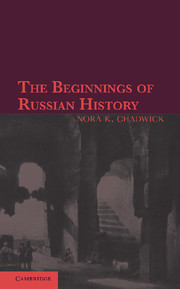Book contents
- Frontmatter
- Dedication
- Epigraph
- Contents
- Preface
- Chapter I The Early Records
- Chapter II The Early History of Kiev
- Chapter III Greek and Oriental Evidence
- Chapter IV Vladimir I
- Chapter V The Treaties with the Greeks, and Russian Heathenism
- Chapter VI Yaroslav the Wise
- Chapter VII Voevoda and Kormilets
- Chapter VIII Vladimir Monomakh
- Appendix I Extract from Ibn Miskawaih, in The Eclipse of the 'Abbasid Caliphate, Vol. v. Translated from the Arabic by D. S. Margoliouth
- Appendix II The Scandinavian Background: Oddr Víth-förli (Örvar-Oddr)
- Index
Chapter VIII - Vladimir Monomakh
Published online by Cambridge University Press: 05 June 2016
- Frontmatter
- Dedication
- Epigraph
- Contents
- Preface
- Chapter I The Early Records
- Chapter II The Early History of Kiev
- Chapter III Greek and Oriental Evidence
- Chapter IV Vladimir I
- Chapter V The Treaties with the Greeks, and Russian Heathenism
- Chapter VI Yaroslav the Wise
- Chapter VII Voevoda and Kormilets
- Chapter VIII Vladimir Monomakh
- Appendix I Extract from Ibn Miskawaih, in The Eclipse of the 'Abbasid Caliphate, Vol. v. Translated from the Arabic by D. S. Margoliouth
- Appendix II The Scandinavian Background: Oddr Víth-förli (Örvar-Oddr)
- Index
Summary
The disunion among the princes consequent upon the death of Yaroslav in 1054 was a signal for the Turkish nomads to make another incursion into the west. The Pechenegs were succeeded, shortly after Yaroslav's death, by another Turkish nomadic people from the steppe, known in Russian sources as Polovtsy, and to classical writers as Cumani. Their Turkish name is Kipchak. Three of Yaroslav's sons, including Izyaslav, who had been installed by Yaroslav as his successor in Novgorod, fought a battle outside Kiev against the Polovtsy by night in 1068, but were defeated and fled, leaving the people of Kiev a prey to their enemy. What follows is extremely significant in its bearing on the problem of the relationship of the descendants of Rurik with the voevodas and with the native Slavonic population. On this occasion, as on the occasion of Yaroslav's defeat at the hands of the Pechenegs in the neighbourhood of Kiev, the people of Kiev rallied, and determined to offer further resistance to the nomads.
To this end they held an assembly in the square and sent an appeal to Izyaslav: ‘ The Polovtsy have spread over the country; O Prince, give us arms and horses, that we may offer them combat once more.’
But Izyaslav turned a deaf ear to their appeal, as Yaroslav had done before, and perhaps for the same reason. The wording of the appeal is significant as indicating once more that the native population regarded the sons of Rurik and the Varangians as something in the nature of a garrison and a professional army. It is not impossible that the Varangians had prohibited the people of Kiev from bearing arms, and that the latter were in consequence somewhat in the position of the Armenians among the Turks before the War of 1914-18. It is interesting to note, however, that when the request of the people of Kiev was disregarded by Izyaslav, their displeasure was directed, not so much against Izyaslav himself, as against Constantine Kosnyachek, his voevoda.
- Type
- Chapter
- Information
- The Beginnings of Russian HistoryAn Enquiry into Sources, pp. 120 - 137Publisher: Cambridge University PressPrint publication year: 2013

